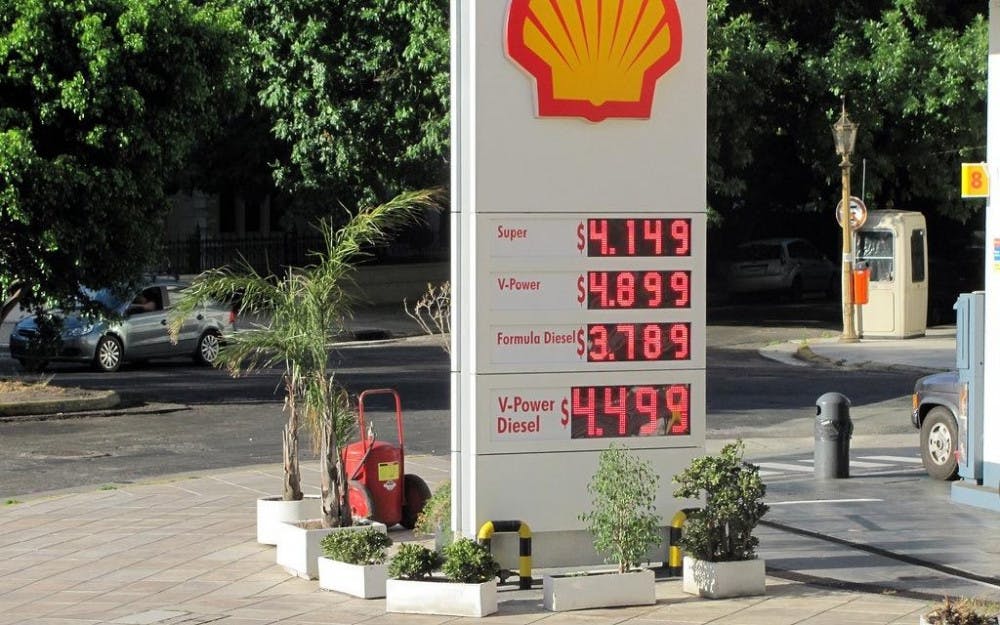
Let’s talk about gas prices. As anyone with a car, or a television knows, the price per gallon increased significantly over the past few months. Most of the Republican candidates blame this increase on the Obama administration’s policies.
I’m going to attempt to explain why oil prices are largely unaffected by the government’s actions.
Will ramping up domestic drilling lower gas prices quickly?
No. Oil is a global commodity. The key word is global—oil from across the planet is traded in various international markets, and all of these markets influence each other’s prices.
For example, the West Texas Intermediate, the United States’ crude price benchmark, is heavily influenced by Brent crude prices, which are in turn influenced by Middle Eastern oil supplies.
Everything is interconnected, and the United States simply doesn’t have enough spare capacity, to push prices downwards in the short-term.
Ramping up domestic drilling would increase this spare capacity, however doing so takes years.
Also, the United States does not nationalize its oil companies, so it cannot take advantage of domestic drilling in the same manner as most other oil producing nations.
So why won’t Obama increase our domestic capacity to lower long-term prices?
Well, he is. Domestic oil production is currently at an all-time high, due to both Obama’s energy policies and increased demand.
While many condemned Obama’s Gulf moratorium, in reality, that barely affected overall capacity.
It reduced only that region’s output by less than 10%. That’s nothing in the big picture.
Again, increasing domestic capacity will only decrease prices in the long-term, and that assumes that drilling can keep up with demand.
It will take many, many years of energy source exploration and development to significantly lower long-term prices. So projects like the Keystone XL pipeline will do nothing to affect current prices, and then will have a limited effect on prices once fully operational.
Why did Energy Secretary Chu and (pre-primary) Mitt Romney support high gas prices?
The massive consumption of fossil fuels is detrimental to our economy in the long run. Many types of emissions are negative externalities—they harm the environment and the health of citizens, and they accelerate global warming.
If gas prices were to increase dramatically (to, say, $10 per gallon), the American economy would rebase itself upon alternative energy sources that do not cause so much harm. Car companies would increase the efficiency of their vehicles, public transportation would expand in quality and scope, etc.
So why are gas prices currently rising?
There are a couple of reasons. Supply and demand (the fundamental laws of economics) is the main one. Demand is extremely high at the moment, therefore prices are increasing.
Supply is also struggling to keep up with this increased demand, partially due to both systematic constraints and Iranian sanctions.
However, the Saudi oil minister recently ramped up his country’s exports in order to reduce prices. He did so because the Kingdom’s oil profits are hurt if prices rise to the point where they reduce demand.
Second, there is speculation. As I mentioned earlier, oil markets are futures markets, in which futures contracts, which are pre-arranged agreements to deliver a barrel of oil for a pre-determined price, are traded.
This allows for speculation. Investors are fearful of regional war with Iran, who controls the Strait of Hormuz, through which 20-30% of global crude is transported.
While the Navy’s Fifth Fleet could easily eliminate any Iranian measures blockading the Strait, such a military maneuver would spike gas prices for a couple of weeks (mines take time to safely remove).
Insurance costs on freighters would also spike for a much longer period of time if conflict were to break out, further increasing gas prices.
Finally, gas prices are also influenced by a variety of other factors unrelated to crude, which only affect two thirds of gas prices.
These factors range from state taxes to distribution costs for gasoline. These, however, are not behind the current price rises.
Why were gas prices so low when Obama first took office?
Because we were in the middle of a sharp recession.
During recessions, people have less disposable income. This reduces demand, which in turn reduces oil prices.
As the economy improves, demand increases, along with oil prices. And the economy strengthened significantly in the past six months.
Should I believe any candidate who promises lower gas prices?
No, probably not. It’s a ploy to get votes. Obama tried it out in 2008, as did every candidate before him. I’d suggest pushing for less harmful energy policies instead. If this country wishes to become energy-independent, it must do so gradually.
The taxing of carbon emissions will force the market to develop new, sustainable (and domestic) energy sources, while allowing time for the labor force and manufacturing sector to readjust.
The beauty of this solution is that it prevents the government from playing venture capitalist in the energy sector (cough, Solyndra).
It simply accelerates the market-fueled process of shifting from fossil fuels to more sustainable and less harmful types of energy.
Oil prices are eventually going to go up, and I’d rather the market shift be gradual, not harsh.
By steadily acclimatizing to the new energy paradigm, a spike in structural unemployment will be avoided. And why not save the environment while you are at it?
Comments or questions about this column can be sent to sean.r.kennedy@live.mercer.edu
Let's talk about gas, baby





